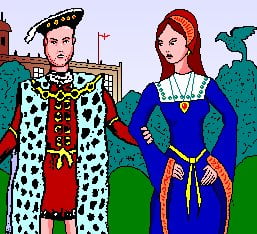 Henry is remembered for his six wives, we are taught that this was the reason he created the Church of England, what we aren’t told is that he achieved so much more than this.
Henry is remembered for his six wives, we are taught that this was the reason he created the Church of England, what we aren’t told is that he achieved so much more than this.
A few of his achievements:
- Increased the size of the navy from only 5 ships to 53.
- Mounted the biggest invasion of France since the reign of King Henry V.
- Built the first English gunship, The Mary Rose 1509.
- Created a chain of coastal fortresses to protect England from the threat of invasion.
- Decreased the power of the nobles while increasing the power of Parliament and the monarchy.
He also:
- Established the Union of England and Wales.
- Was given the title King of Ireland by the Irish Parliament in 1541.
- Wwas a musician and a composer! They say he composed both ‘Greensleeves’ and ‘Helas Madame’.
His Problem
Was that although his marriage to Catherine of Aragon had yielded a daughter, Princess Mary, and he had a son (Henry Fitzroy) from one of his affairs. He was convinced that a queen would not be strong enough to stop other factions stealing the throne. How wrong was he! His daughter Elizabeth became one of our greatest monarchs.
However, he had been married to Catherine for over twenty years, as she was too old to bear children, he had to get rid of her or remain without an heir.
What did he do?
To start with he tried to get the Catholic Church to annul his marriage, however Rome would not play ball and grant an annulment.
 Therefore, the only way Henry could get one was to separate the English Church from Rome. He would then be in charge, and his divorce could be granted.
Therefore, the only way Henry could get one was to separate the English Church from Rome. He would then be in charge, and his divorce could be granted.
Henry started Church of England and appointed himself the supreme head of the church. Now free and independent of the Pope in Rome, he could get his divorce.
The result was that even though the Pope had refused to annul the King’s marriage to Catherine of Aragon, the English population were more than happy to be relieved of the rule of Rome.
The Effects of his decision in Europe.
His actions, which were simply so that he could divorce, however he started something amazing elsewhere, in fact, I think, much more than he ever imagined.
Basically, his actions boosted the spread of Martin Luther’s protestant ideas, a German religious reformer, Basically, until now Martin Luther’s views were only percolating throughout Europe, however, once the new Church of England allowed Protestant ideas to thrive it led to the growth of Protestantism across the whole of Europe.
Henry may not have been a Protestant, he probably wasn’t, however, the new Church of England allowed Protestantism ideas to become part of the Church of England, aiding the spread of Lutheranism around Europe.
Therefore, there are several reasons to ask “have we got Henry VIII wrong, was he in reality a great King?”
The Musical
 To help your children understand this important time in history our sister site Educational Musicals has published a schools musical HENRY VIII – The Break With Rome which tells this story through a script, that never has more than five lines for any speech, along with twelve original songs that your children will walk round the school singing.
To help your children understand this important time in history our sister site Educational Musicals has published a schools musical HENRY VIII – The Break With Rome which tells this story through a script, that never has more than five lines for any speech, along with twelve original songs that your children will walk round the school singing.
Just click on HENRY VIII – The Break With Rome where you can read two pages of script and hear two of the songs.
Let’s make history fun?
10 questions to discuss:
- Beyond the six wives, what evidence supports the blog’s claim that Henry VIII achieved “so much more”? Are these achievements truly significant in the context of his reign?
- How reliable is the information presented in the blog regarding Henry’s accomplishments? Are there any historical debates or nuances surrounding these achievements?
- Was Henry VIII truly motivated by the lack of a male heir when seeking an annulment from Catherine of Aragon? What other factors might have played a role?
- The blog simplifies the process of establishing the Church of England. How accurate is this portrayal, and what were the broader political and religious implications of this act?
- Did the English population truly welcome the separation from Rome, or were there dissenters and resistance? How did this division impact English society?
- To what extent can Henry VIII be credited with the spread of Protestantism in Europe? What other factors and individuals contributed to this phenomenon?
- Does the blog adequately consider the negative aspects of Henry’s reign, such as his authoritarian rule, religious persecution, and executions?
- How can we critically evaluate historical figures like Henry VIII, acknowledging both their achievements and their flaws?
- What are the potential dangers of simplifying complex historical narratives and focusing solely on heroic or villainous portrayals?
- Based on the evidence and historical context, do you think the blog successfully argues that Henry VIII deserves a more positive reevaluation as a king? Why or why not?
These questions encourage critical engagement with the blog’s claims and foster a deeper understanding of the complexities of Henry VIII’s reign and its impact on England and Europe.
For more information:

